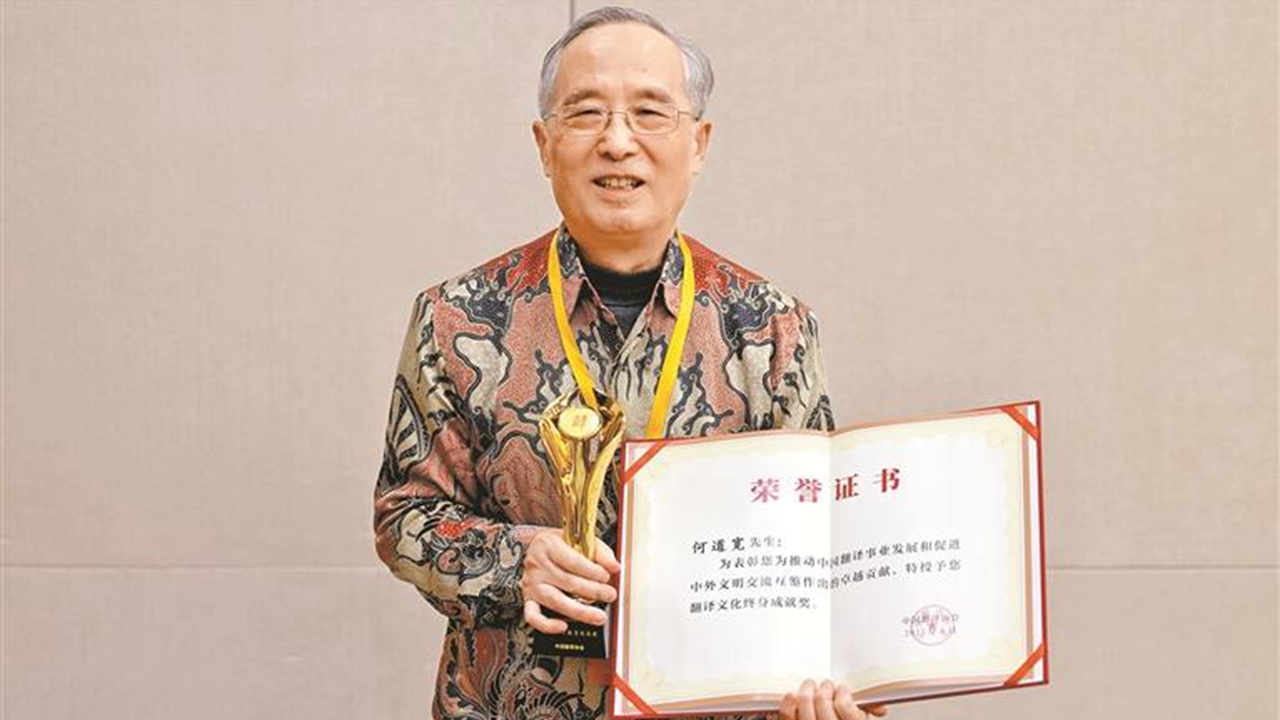SZU prof. wins national highest translation honor
Writer: Wang Jingli | Editor: Zhang Chanwen | From: Shenzhen Daily | Updated: 2023-04-06
A+ A- Print
He Daokuan, Chinese renowned translator and professor from Shenzhen University (SZU), received a Lifetime Achievement Award in Translation from the Translators Association of China (TAC) on Monday.
He is the first translator from Shenzhen as well as Guangdong Province to win the honor, according to Shenzhen Special Zone Daily.

He Daokuan poses for a photo with his award certificate. Shenzhen Economic Daily
In 2006, TAC established its Lifetime Achievement Award in Translation, and it is the highest honor conferred to translators who have outstanding academic achievements and widespread recognition.
The goal of the award is to encourage Chinese translators and interpreters to follow the example of the awardees, carry forward their professional dedication by enhancing professional qualities, and contribute more to the field of translation. As of now, some 38 translators including Ji Xianlin, Xu Yuanchong and Yang Xianyi have received the honor.
He, born in 1942, has been involved in cultural research and academic translation for over 40 years. He once taught at Sichuan International Studies University and SZU. He published 110 translated works with more than 25 million words, covering many fields such as literature, history and philosophy.
He said he was honored to receive the award and said in an interview with the Daily that “academic translation is extremely difficult, but I enjoy its bitterness as if it were malt sugar.”
He has helped to promote the study on Marshall McLuhan who is famous for his phrase “the medium is the message.”
In 1980, He was part of the first batch of teachers in the country to study abroad after the reform and opening up. At that time, He was exposed to emerging disciplines such as communication and intercultural communication in the U.S., as well as world masters such as Marshall McLuhan, Edward Hall, Ralph Linton and Desmond Morris.
With great efforts, He finally introduced the classic works of these renowned masters, providing a useful reference for China’s academic prosperity in the new era.
Michael H. Prosser, one of the founders of cross-cultural communication in the U.S., once commented that He is one of the founders of cross-cultural communication research in China and has contributed to the expansion of communication studies in Chinese universities.
He was once persuaded to set up a team for the academic translation. However, He believed that academic translation is better suited to be done by individuals.
He works over 10 hours a day and produces 1 million words each year on average after he retired in 2002. For more than 20 years, He insisted on working from 9 p.m. to 3 a.m. next day and said it feels stunning to stay awake when other people are asleep.
He said he only did three things — eating, sleeping and translating books during the pandemic lockdown. When talking about ChatGPT, He said that “I welcome it and I am cautious as I think people’s initiatives cannot be replaced. I myself refuse to use artificial intelligence to translate academic papers.”
“My life experience is that every time you go to a new environment, as long as you work hard, the studies you are doing will reach a new stage. There are many people in Shenzhen and SZU who are pursuing their studies very hard,” He said.
He also called for governments at all levels and academic institutions to attach importance to academic translation, especially academic translation on exchanges between China and foreign countries.